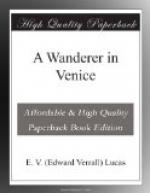[Illustration: THE CORNER OF THE OLD LIBRARY AND THE DOGES’ PALACE]
Ziani seems to have been a man of address, but the great Enrico Dandolo was something more. He was a superb adventurer. He became Doge in 1193, at the trifling age of eighty-four, with eyes that had long been dimmed, and at once plunged into enterprises which, if not greatly to the good of Venice, proved his own indomitable spirit and resource. It was the time of the Fourth Crusade and the Venetians were asked to supply transports for the French warriors of the Cross to the theatre of war. After much discussion Dandolo replied that they would do so, the terms being that the Venetian vessels should carry 4500 horses, 9000 esquires, and 20,000 foot soldiers, with provisions for nine months, and for this they should be paid 85,000 silver marks. Venice also would participate in the actual fighting to the extent of providing fifty galleys, on condition that half of every conquest, whether by sea or by land, should be hers. Such was the arrangement, and the shipbuilding began at once.
But disaster after disaster occurred. The Christian commander sickened and died; a number of Crusaders backed out; others went direct to Palestine. This meant that the Venetians, who had prepared for a mighty host, incurred immense expenses which could not be met. As some reparation it was suggested to the small army of Crusaders who did arrive in the city for deportation that on their way to the Holy Land they should stop at Zara, on the Dalmatian coast, an unruly dependence of the Republic, and assist in chastising it. The objections to this course were grave. One was that the King of Hungary, in whose dominions was Zara, was a Christian and a Crusader himself; another that the Pope (Innocent III) forbade the project. Old blind Dandolo, however, was adamant. Not only must the Crusaders help the Venetians whom they had so much embarrassed by their broken bond, but he would go too. Calling the people together in S. Mark’s, this ancient sightless bravo asked if it was not right that he should depart on this high mission, and they answered yes. Descending from the pulpit, he knelt at the altar and on his bonnet the Cross was fastened.
Before the expedition left, a messenger came from Alexius, nephew of the usurping King of Constantinople and son of the rightful king, praying the Venetians to sail first for Constantinople and support his father’s case, and to deal faithfully with Zara later; but Dandolo said that the rebellious Zara had prior claims, and in spite of Papal threats and even excommunication, he sailed for that place on November 10, 1202. It did not take long to subdue the garrison, but winter setting in, Dandolo decided to encamp there until the spring. The delay was not profitable to the Holy Cause. The French and the Venetians grew quarrelsome, and letters from the Pope warned the French (who held him in a dread not shared by their allies) that they must leave Zara and proceed with the Crusade instantly, or expect to suffer his wrath.




